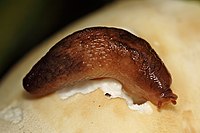
Photo from wikipedia
Abstract The Panel on Plant Health performed a pest categorisation of small‐spored Alternaria carrying the genes for the AM‐ or AK‐toxin biosynthesis, for the EU. The identity of the pests… Click to show full abstract
Abstract The Panel on Plant Health performed a pest categorisation of small‐spored Alternaria carrying the genes for the AM‐ or AK‐toxin biosynthesis, for the EU. The identity of the pests is clearly defined and reliable methods exist for their detection/identification. They are listed in Annex IIAI of Directive 2000/29/EC as Alternaria alternata (non‐European pathogenic isolates). Their distribution in the EU is restricted though with some uncertainty. The AM‐toxin producer Alternaria affect Malus spp. and Pyrus communis (European pear), whereas the AK‐toxin producer affect Pyrus pyrifolia, Pyrus bretschneideri and Pyrus ussuriensis (Asian pears). The pests could potentially enter the EU on host‐planting material and fruit originating in infested countries. There are no biotic/abiotic factors limiting their potential establishment and spread in the EU, as their epidemiology is similar to that of other well‐established Alternaria spp. Apples and European pears are widespread in the EU; Japanese pears are also present, but no data was found on their abundance/distribution. In the infested areas, the pests cause premature defoliation, fruit spotting and rot resulting in yield/quality losses. It is expected that the introduction and spread of the pests in the EU could impact apple and pear production, although the magnitude is unknown. Cultural practices and chemical measures may reduce the inoculum and the disease, but they cannot eliminate the pests. Phytosanitary measures are available to mitigate the risk of introduction and spread of the pests. The pests do not meet all the criteria assessed by EFSA for consideration as potential Union quarantine pests, as they are not under official control in those EU restricted areas where they have been found. The pests do not meet all the criteria assessed by EFSA to consider them as Union regulated non‐quarantine pests, as host plants for planting are not the main means of pest spread.
Journal Title: EFSA Journal
Year Published: 2017
Link to full text (if available)
Share on Social Media: Sign Up to like & get
recommendations!